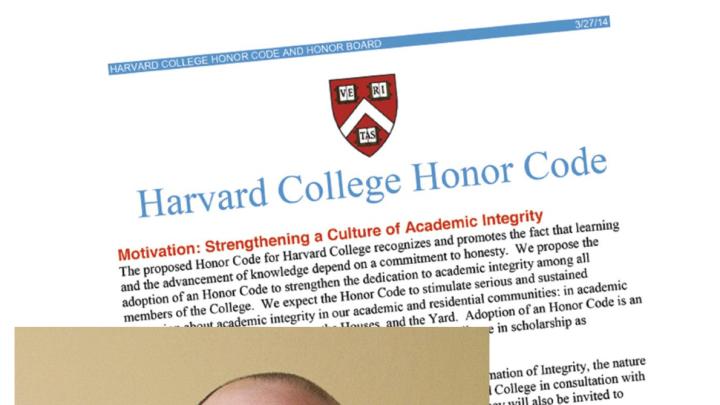Amid the Divest Harvard protestors’ late-April blockade of the president’s office (see “The Divestment Debate,”) and the debate about sexual assault (see “Addressing Sexual Assaults”), other issues roiled the end of the semester; several are summarized here.
A College Honor Code
Following four years of research and outreach by its committee on academic integrity—a period punctuated by the 2012-2013 investigation of the largest recent case of suspected misconduct on an examination, and punishment of dozens of undergraduates—the Faculty of Arts and Sciences (FAS) on May 6 enacted an honor code for undergraduates.
“[T]o strengthen the dedication to academic integrity,” the College adopted a code described as follows:
Members of the Harvard College community commit themselves to producing academic work with integrity—that is, work that adheres to the scholarly and intellectual standards of accurate attribution of sources, appropriate collection and use of data, and transparent acknowledgment of the contribution of others to our ideas, discoveries, interpretations, and conclusions. Cheating on exams or problem sets, plagiarizing or misrepresenting the ideas or language of someone else as one’s own, falsifying data, or any other instance of academic dishonesty violates the standards of our community, as well as the standards of the wider world of learning and affairs.
“Commitment” to the code, which takes effect in the fall of 2015, is to be demonstrated through an “affirmation of integrity,” the specifics of which will be recommended by the dean of Harvard College and ultimately considered by the full faculty for inclusion in the Handbook for Students. Language circulated to the faculty in March included this language for the affirmation: “I attest to the honesty of my academic work and affirm that it conforms to the standards of the Harvard College Honor Code.” Cases concerning possible violations will be adjudicated by a new Honor Board, not the existing Administrative Board; members will include undergraduates, resident deans, professors, administrators, and graduate students; the dean or his designee will serve as chair.
Adoption was never in doubt, and the measure passed overwhelmingly, but the faculty debate aired several criticisms. Some professors objected to the appropriateness of administering an oath or affirmation to the Harvard community, or part of it. Others questioned the efficacy of such procedures for promoting appropriate academic behavior, and pointed to broader measures shaping the campus culture. And there were, generally, concerns about an asymmetrical process that seems to single out student conduct without explicitly emphasizing professors’ reciprocal obligations to the students whom they teach.
Rakesh Khurana, who becomes dean of Harvard College on July 1, will be responsible for implementation; he participated in the committee’s work. For details about the code, its background, and the debate, see http://harvardmagazine.com/2014/05/harvard-college-adopts-honor-code.
Separately, in a sort of coda to the honor-code debate and the 2012-2013 academic-misconduct case, two central figures in that grueling investigation announced that they are leaving Harvard. John L. “Jay” Ellison, secretary of the Administrative Board since 2005, will become dean of students at the University of Chicago. Adams House resident dean Sharon L. Howell—an outspoken critic of searches of resident deans’ e-mail account headings after it appeared that Ad Board information about the investigation had been passed to news media—is moving to Northfield Mount Hermon School. (See below on the new communications-privacy policy.)
E-privacy Policy Approved
The Harvard Corporation in late March approved a new, University-wide policy on access to electronic communications. The policy was drafted by a task force led by Green professor of law David Barron, following College administrators’ controversial decisions to access information about e-mails during an Administrative Board investigation into undergraduate academic misconduct (see “E-mail Imbroglio,” May-June 2013; on May 22, the U.S. Senate confirmed Barron’s appointment as a judge on the First Circuit Court of Appeals).
Changes to the policy since a draft was posted on February 26 (see “An E-privacy Policy,” May-June 2014) inviting community comment were mostly minor, but a subsection covering “Internal Investigations of Misconduct” now reiterates the need to weigh any decision to access electronic information against “University values”—identified earlier in the document as including “academic freedom and internal trust and confidence,” for example. The policy also includes provisions for record-keeping to enable review by an independent oversight committee, which will be chaired by Goldston professor of law John Goldberg.
President Drew Faust thanked Barron and the task force for their “thoughtful and thorough work,” adding that it reflected “the values that underpin our work as an academic community—transparency, trust, and respect for academic freedom—and as such will serve us well in the years ahead.”
From Courses to Credits… and Beyond?
As an administrative measure, FAS also voted to move from tracking academic units in terms of courses to the credit-hour system in nearly universal use in higher education. The immediate motivation for converting each semester-long, half course into four credits (and thereby making an undergraduate course of study 128 credits) is the student-information system coming online in the fall of 2015. It is credit-based, as are the norms of reporting for higher-education accreditation.
But a careful parsing of the legislative language (“courses in the sciences, arts and humanities, engineering and applied sciences, social sciences, and medical sciences shall all earn four credits per semester course”) reveals that it may, over time, become permissive, rather than prescriptive. Graduate School of Arts and Sciences students already take shorter biomedical “modules”: and quarter- and nano-courses on specific topics, for which the semester term no longer obtains. Online courses offered through HarvardX are being disaggregated into shorter learning-unit modules, covering a single topic, problem set, or segment of a larger course. And faculty members are clearly discussing shorter for-credit options that might take advantage of the extended January break, or opportunities for separating and mixing and matching labs from the courses with which they are now associated.
Any such formats would require faculty review and approval—but the discussion is clearly under way at Harvard, and much more comprehensively at MIT, whose president commissioned a report in which faculty advocated “unbundling of education” and achieving “greater modularity in the MIT undergraduate curriculum, from a top-down approach that decomposes existing courses into modules to a bottom-up approach that re-engineers a curriculum by identifying the core concepts and associated modules that underlie them or build upon them,” with the aim of “providing greater flexibility for students to customize their degree programs.” These issues are explored fully at http://harvardmagazine.com/2014/05/harvard-shift-to-course-credits-0.
Gender-neutral Housing
Almost in passing, the amendments to the language in the Handbook for Students—which were adopted routinely at the May 6 FAS meeting—turn the pilot program on gender-neutral housing (initiated at the request of transgender students) into a regular possibility, subject to a review procedure. Thus, “Rising sophomore, juniors, and seniors may request to form mixed-gender rooming groups.” All occupants must voluntarily agree to the arrangement, and requests are “addressed and managed on a case-by-case basis, taking into account all circumstances, including space constraints.”









